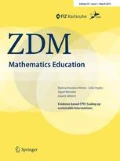Abstract
Research on the sociocultural and sociopolitical dimensions of mathematics education has grown substantially in the last three decades to become part of the mathematics education mainstream. However, little attention has been given to sociocultural and sociopolitical dimensions of adult numeracy practices of migrants in their host countries. The purpose of this paper is to identify the sociocultural and sociopolitical dimensions of adult numeracy; to make visible the sociocultural and sociopolitical aspects that impact adult numeracy of migrants as vulnerable groups; to frame the sociocultural and sociopolitical dimensions of migrant groups’ adult numeracy; and to review and critique research on migrants’ adult numeracy from socio-cultural–political perspectives. The paper engages theoretical analytic argumentation and critical examination of evidence from relevant research studies. Implications are drawn for research on the sociopolitical dimensions of adult numeracy in general, and migrants’ numeracy in particular, and for incorporating adult numerate practices in school mathematics curriculum and instruction.

Similar content being viewed by others
References
Anderson, J. R., Reder, L. M., & Simon, H. A. (1996). Situated learning and education. Educational Researcher,25(4), 5–11.
Batalova, J., & Fix, M. (2015). Through an immigrant lens: PIAAC assessment of the competencies of adults in the United States. Migration Policy Institute, Washington, DC. file:///C:/Users/User/Desktop/ZDM%20NUMERACY/research/2015%20PIAAC-Immigrant-Adult-Profile%20(1)%20(1).pdf. Accessed 19 Nov 2018.
Batalova, J. & Fix, M. (2016). Literacy and numeracy skills of second-generation young adults: A comparative study of Canada, France, Germany, the United Kingdom, and the United States. Migration Policy Institute, Washington, DC. https://static1.squarespace.com/static/51bb74b8e4b0139570ddf020/t/578d1e95579fb360acc952bf/1468866198724/Batalova_Fix_PIAAC.pdf.%20Washington%20DC. Accessed 19 Nov 2018.
Bourdieu, P., & Passeron, J. C. (1990). Reproduction in education, society and culture (2nd ed.). London: Sage Publications.
Engeström, Y. (2001). Expansive learning at work: Toward an activity theoretical reconceptualization. Journal of Education and Work,14(1), 133–156.
Evans, J. (2000). Adults’ mathematical thinking and emotions. London: Routledge.
Freire, P., & Macedo, D. (1987). Literacy: Reading the word and the world. Westport: Bergin & Garvey.
Goos, M., Geiger, V., & Dole, S. (2014). Transforming professional practice in numeracy teaching. In Y. Li, E. Silver, & S. Li (Eds.), Transforming mathematics instruction—Advances in mathematics education. Cham: Springer.
Greiffenhagen, C., & Sharrock, W. (2008). School mathematics and its everyday other? Revisiting Lave’s ‘cognition in practice’. Educational Studies in Mathematics,69(1), 1–21.
Gutiérrez, R. (2013). The sociopolitical turn in mathematics education. Journal for Research in Mathematics Education,44(1), 37–68.
Jablonka, E. (2003). Mathematical literacy. In A. Bishop (Ed.), Second international handbook of mathematics education (pp. 75–102). Dordrecht: Kluwer.
Jurdak, M. (2006). Contrasting perspectives and performance of high school students on problem solving in real world, situated, and school contexts. Educational Studies in Mathematics,63(3), 283–301.
Jurdak, M. (2016). Learning and teaching real world problem solving in school mathematics. Cham: Springer.
Jurdak, M., & Shahin, I. (1999). An ethnographic study of the computational strategies of a group of young street vendors in Beirut. Educational Studies in Mathematics,40, 155–172.
Jurdak, M., & Shahin, I. (2001). Problem solving activity in the workplace and the school: The case of constructing solids. Educational Studies in Mathematics,47, 297–315.
Lave, J. (1988). Cognition in practice. New York: Cambridge University Press.
Leont’ev, A. N. (1978). Activity, consciousness, and personality. Englewood Cliffs: Prentice-Hall.
Leont’ev, A. N. (1981). The problem of activity in psychology. In J. Wertsch (Ed.), The concept of activity in Soviet psychology (pp. 37–71). Armonk: M. E. Sharpe.
Lerman, S. (2000). The social turn in mathematics education research. In J. Boaler (Ed.), Multiple perspectives on mathematics teaching and learning (pp. 19–44). Westport: Ablex.
Lerman, S. (2006). Cultural psychology, anthropology and sociology: The developing ‘strong’ social turn. In J. Maasz & W. Schloeglmann (Eds.), New mathematics education research and practice (pp. 171–188). Rotterdam: Sense Publishers.
Levels, M., Dronkers, J., & Jencks, C. (2017). Contextual explanations for numeracy and literacy skill disparities between native and foreign-born adults in western countries. PLoS One.,15, 6. https://doi.org/10.1371/journal.pone.0172087. (Open access journal, Accessed 26 January 2019).
Lind, P., & Mellander, E. (2016). Relations between immigration and adult skills: Findings based on PIAAC. Working Paper (No. 2016: 21), IFAU—Institute for Evaluation of Labour Market and Education Policy. file:///C:/Users/User/Desktop/ZDM%20NUMERACY/research/2016%20Relations%20between%20immigration%20and%20adult%20skills.pdf. Accessed 19 Nov 2018.
Maalouf, A. (2000). On identities. London: The Harvill Press.
Norton, S., McRobbie, C., & Ginns, I. (2007). Problem solving in a middle school robotics design classroom. Research in Science Education,37(3), 261–277.
Nussbaumer, D. (2012). An overview of cultural historical activity theory (CHAT) use in classroom research 2000 to 2009. Educational Review,64(1), 37–55.
Organisation for Economic Co-operation and Development (OECD). (2012). Literacy, numeracy and problem solving in technology-rich environments: Framework for the OECD Survey of Adult Skills. Paris: OECD.
Organisation for Economic Co-operation and Development (OECD). (2013). OECD skills outlook first results from the Survey of Adult Skills. Paris: OECD.
Organisation for Economic Co-operation and Development (OECD). (2017). Why are immigrants less proficient in literacy than native-born adults? Adult Skills in Focus No,6, 2018. https://doi.org/10.1787/30b23d82-en. (accessed 19 November).
Reed, H. J., & Lave, J. (1981). Arithmetic as a tool for investigating between culture and cognition. In R. Casson (Ed.), Language, culture and cognition: Anthropological perspectives (pp. 437–455). New York: Macmillan.
Schleicher, A. (2006). Where immigrant students succeed: A comparative review of performance and engagement in PISA 2003. Intercultural Education,17(5), 507–516. https://doi.org/10.1080/14675980601063900.
Skovsmose, O. (2011). An invitation to critical mathematics education. Rotterdam: Sense Publishers.
Street, B. V. (1993). Cross-cultural approaches to literacy. Cambridge: Cambridge University Press.
Vithal, R., & Jurdak, M. (2018). Mainstreaming of the sociopolitical in mathematics education. In M. Jurdak & R. Vithal (Eds.), Sociopolitical dimensions of mathematics education—From the margin to mainstream (ICME-13 Monographs Series). New York: Springer.
Williams, J., & Wake, G. (2007). Black boxes in workplace mathematics. Educational Studies in Mathematics,64(3), 317–343.
Author information
Authors and Affiliations
Corresponding author
Additional information
Publisher's Note
Springer Nature remains neutral with regard to jurisdictional claims in published maps and institutional affiliations.
Rights and permissions
About this article
Cite this article
Jurdak, M. The sociopolitical and sociocultural dimensions of migrants’ adult numeracy. ZDM Mathematics Education 52, 515–525 (2020). https://doi.org/10.1007/s11858-019-01079-z
Accepted:
Published:
Issue Date:
DOI: https://doi.org/10.1007/s11858-019-01079-z



